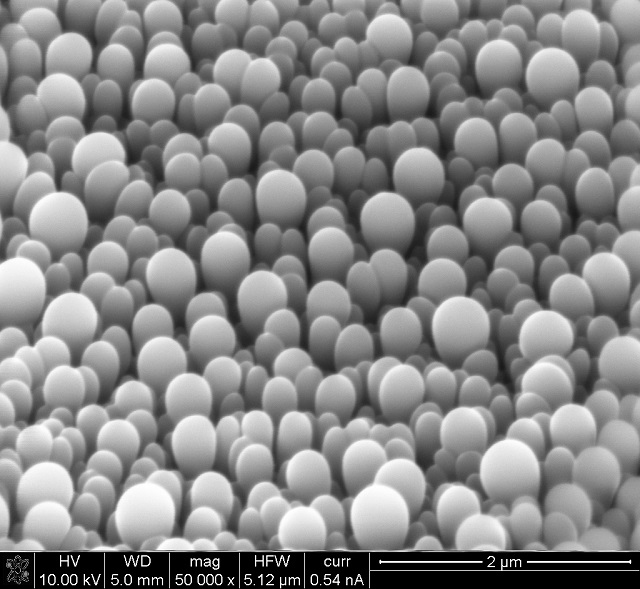 University of Michigan engineering professors have made rounded crystals with no facets, a structure occasionally found in nature but difficult to produce in a lab. Image credit: Max Shtein
University of Michigan engineering professors have made rounded crystals with no facets, a structure occasionally found in nature but difficult to produce in a lab. Image credit: Max Shtein
Researchers from the University of Michigan have created nanolobes, which are rounded crystalline structures without any facets. The design resembles starfish shell texture, which is almost impossible to create in the laboratory. The shape of the nanolobes as well as the technique by which they are made have potential applications such as a light guide in advanced LEDs, non-reflective surfaces and solar cells.
Boron subphthalocyanine chloride is normally used in solar cells and this material was used for creating the nanolobes. It can be classified as tiny molecular compounds, which either make faceted crystals with pointed edges or flat films. However, these kinds of non-faceted shapes have not been realized till now.
We call them nanolobes. They look like little hot air balloons that are rising from the surface.
Olga Shalev, doctoral student
In the year 2010, a then doctoral student, Shaurjo Biswas, while creating solar cells using the organic vapour jet printer observed that the boron subphthalocyanine chloride, began to form ordered shapes at a film thickness of more than 600nm, which was an unusual phenomenon.
He observed that at 800nm the nanolobe emerged repeatedly. Olga Shalev, a doctoral student in material science and engineering and the first author of the paper published in Nature Communications, took on the research and did the experiments again in an altered apparatus, thus offering better control on the conditions.
Shalev and Roy Clarke collaborated to understand this facetless crystallization better. Organic vapour jet printing is similar to spray painting except that it uses a gas instead of a liquid. The researchers believe that the technique holds promise for emerging 3D-printed pharmaceutical concepts. The researchers believe that this technique is an accurate method to manipulate the shape and size of medicine particles for better absorption into the human body. Drugs can also be linked to other materials directly and there is no need for any solvents.
Nanolobes
The title of the research is "Growth and modelling of spherical crystalline morphologies of molecular materials."
References